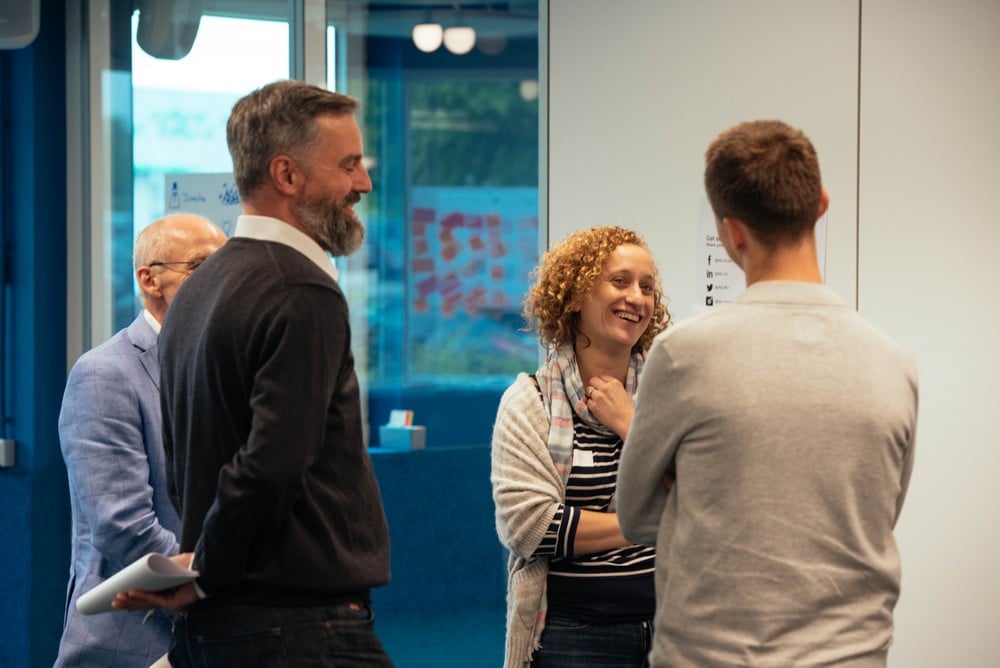Knowledge makes the world go round. Therefore, the key question for every company that still wants to be in the race tomorrow is: how can we keep our employees – and the valuable knowledge they possess – on board for as long as possible? But implementing an effective retention policy is no easy feat. After all, a happy employee is someone who feels they can develop their talents to their heart's content – a sore point for most organizations.
Team Lotus felt it was time to make some changes during the AE Hackathon See/d the future!

Lost in a sea of knowledge
“Most knowledge workers do have an idea of where they’re headed next (that is, if they’re supported by a good coach), but don’t quite know which path will lead them in the right direction,” explains Danielle Glassée from Team Lotus. “Because the range of training programmes available today is so vast, it’s becoming harder and harder for them to see the forest for the trees. Ironically, business unit managers in their organisation know perfectly which profiles the company will be needing in the future, but lack a platform and a ‘battle plan’ to give those vacancies a concrete definition.”
Mapping out growth paths
Lotus is a tool that makes it easier as well as more effective for people to achieve personal growth on a professional level and receive proper support while doing so. Danielle: “While we do notice that companies are aware of the importance of training and coaching, the way in which they communicate training opportunities to their employees does not exactly invite the latter to think in terms of growth paths. Moreover, these companies tend to ignore the fact that employees grow primarily through challenging assignments (and only 10% through training programmes). Lotus helps employees to plan and follow their own growth path, while also supporting the business unit managers and coaches who help maximize each employee’s potential.
Decisions, decisions, decisions
Preparation is key if you’re looking to blow everyone away at the AE Hackathon, Team Lotus knew all too well. “We first brainstormed extensively and put together a balanced team of technical experts and experienced business profiles,” says Danielle. “After that, we settled on a scope for the Hackathon and decided which technologies we would be using.”
Spider diagram
Team Lotus certainly did not opt for the easiest solution. Lotus had to become a very visual tool, presenting potential growth paths by means of a “metro map” not unlike a spider diagram. Together with their coach, each worker can easily compare their current profile to the role they aspire and determine in which fields they have yet to grow. When it came to tech, Team Lotus resolutely opted for D3 with Vue.js as additional front-end technology.
Doctor visit
Because the Hackathon only lasts 36 hours, it soon became apparent that the scope of the ambitious Lotus project was slightly too broad. Instead, the team decided to focus primarily on the experience of the knowledge workers who would be using the platform. “The coaching of our innovation experts offered during the Hackathon proved to be an added value for us,” Danielle continues. “Thanks to the doctors specialized in innovation and UX, we gained a better view of our business model and paid maximum attention to the user experience our tool provides. In this way, we were able to change course in time to achieve results which our entire team is rightfully proud of, if I may say so myself.”
Pitch perfect!
AE has been working for years to help all AE team members become aware of their ambitions and turn them into reality, but lacks a platform that clearly maps out the different routes to get there. Hence, Team Lotus received a lot of positive reactions following their pitch. Indeed, Lotus as a tool fits in perfectly with AE’s broader objectives concerning community thinking and long-term coaching across various allocations.
Minimum Viable Product
“Nevertheless, we have always kept the business value for various stakeholders in mind as to not be blinded by our own experience as members of AE,” Danielle adds. “At this point, I think it is important to involve more people in order to create an MVP that not only makes for a perfect addition to our very own employee engagement platform, but also complements the platforms of other organizations for whom knowledge development and people growth is a top priority.”





